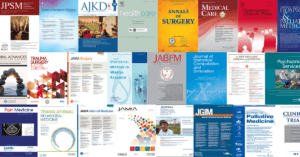 NIH Collaboratory researchers in 2021 shared study results, generated new knowledge, and developed innovative research methods in pragmatic clinical trials. Their work included insights from the Coordinating Center and Core Working Groups, analyses from the NIH Collaboratory Distributed Research Network, and results and methodological approaches from the NIH Collaboratory Trials.
NIH Collaboratory researchers in 2021 shared study results, generated new knowledge, and developed innovative research methods in pragmatic clinical trials. Their work included insights from the Coordinating Center and Core Working Groups, analyses from the NIH Collaboratory Distributed Research Network, and results and methodological approaches from the NIH Collaboratory Trials.
So far this year, the NIH Collaboratory has produced 3 dozen articles in the peer-reviewed literature, including the primary results of the PPACT and TSOS trials, the study design of the Nudge and OPTIMUM studies, insights into the COVID-19 pandemic from the EMBED and ACP PEACE studies, and more:
NIH Collaboratory Coordinating Center
- Mixed-effects models for the design and analysis of stepped wedge cluster randomized trials: an overview
- Accounting for quality improvement during the conduct of embedded pragmatic clinical trials within health care systems: NIH Collaboratory case studies
- Is learning worth the trouble? Improving healthcare system participation in embedded research
- Patients’ reactions to letters communicating collateral findings of pragmatic clinical trials: a national web-based survey
- Identification and management of pragmatic clinical trial collateral findings: a current understanding and directions for future research
- Enhancing the use of EHR systems for pragmatic embedded research: lessons from the NIH Health Care Systems Research Collaboratory
- Incentives and payments in pragmatic clinical trials: scientific, ethical, and policy considerations
NIH Collaboratory Distributed Research Network
- Antidopaminergic-antiparkinsonian medication prescribing cascade in persons with Alzheimer’s disease
ACP PEACE NIH Collaboratory Trial
- Clinical outcomes of patients hospitalized with coronavirus disease 2019 (COVID-19) in Boston
- Natural language processing to identify advance care planning documentation in a multisite pragmatic clinical trial
- A yet unrealized promise: structured advance care planning elements in the electronic health record
BackInAction NIH Collaboratory Trial
EMBED NIH Collaboratory Trial
- Mixed-effects models for the design and analysis of stepped wedge cluster randomized trials: an overview
- Emergency department visits for nonfatal opioid overdose during the COVID-19 pandemic across 6 US healthcare systems
- The association between perceived electronic health record usability and professional burnout among US nurses
GRACE NIH Collaboratory Trial
HiLo NIH Collaboratory Trial
LIRE NIH Collaboratory Trial
- Providing epidemiological data in lumbar spine imaging reports did not affect subsequent utilization of spine procedures: secondary outcomes from a stepped-wedge randomized controlled trial
- Effects of including epidemiologic data in lumbar spine imaging reports on prescribing non-opioid medications for pain
- Patient, provider, and clinic characteristics associated with opioid and non-opioid pain prescriptions for patients receiving low back imaging in primary care
Nudge NIH Collaboratory Trial
- Text message medication adherence reminders automated and delivered at scale across two institutions: testing the Nudge system: pilot study
- Nudge me: tailoring text messages for prescription adherence through N of 1 interviews
- The NUDGE trial pragmatic trial to enhance cardiovascular medication adherence: study protocol for a randomized controlled trial
OPTIMUM NIH Collaboratory Trial
PPACT NIH Collaboratory Trial
PRIM-ER NIH Collaboratory Trial
- Access to home and community health services for older adults with serious, life-limiting illness: a study protocol
- Effectiveness and reach of the Primary Palliative Care for Emergency Medicine (PRIM-ER) pilot study: a qualitative analysis
PROVEN NIH Collaboratory Trial
- Impact of an advance care planning video intervention on care of short-stay nursing home patients
- Using the potential outcome framework to estimate optimal sample size for cluster randomized trials: a simulation-based algorithm
SPOT NIH Collaboratory Trial
- Brief interventions via electronic health record messaging for population-based suicide prevention: mixed methods pilot study
- Reconciling statistical and clinicians’ predictions of suicide risk
- Zelen design clinical trials: why, when, and how
TSOS NIH Collaboratory Trials
- Leveraging a health information exchange to examine the accuracy of self-report emergency department utilization data among hospitalized injury survivors
- Stepped collaborative care targeting posttraumatic stress disorder symptoms and comorbidity for US trauma care systems: a randomized clinical trial
- Catalyzing the translation of patient-centered research into United States trauma care systems: a case example
- A prospective US national trauma center study of firearm injury survivors weapon carriage and posttraumatic stress disorder symptoms


